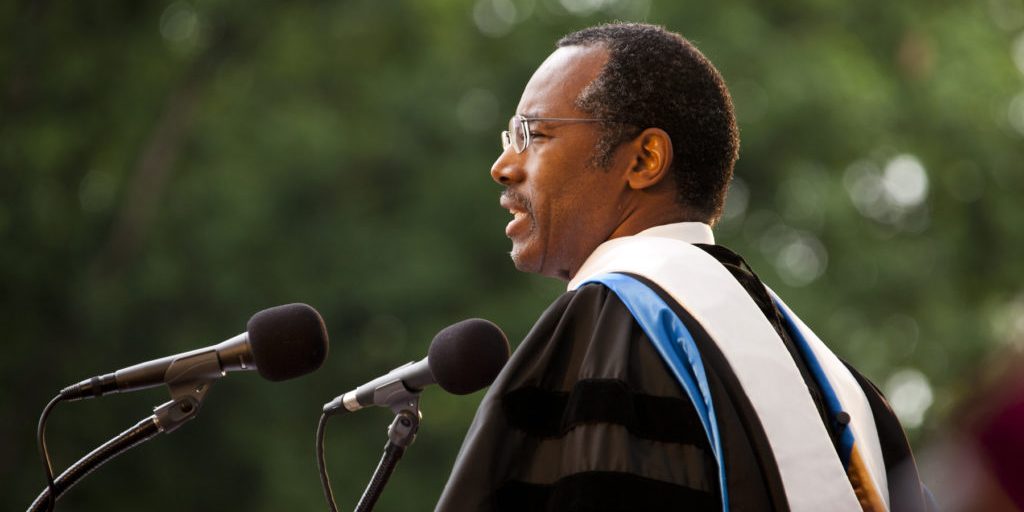
Consternation over Ben Carson, Evolution, and Morality
By Richard Weikart–
Yesterday, May 14th, almost 500 Emory University faculty and students expressed their dismay that their commencement speaker did not toe the ideological line when it came to evolutionary biology. Yes, gasp, the renowned Johns Hopkins neurosurgeon Ben Carson does not believe in evolutionary theory. Not only that, but biology professors at Emory and their supporters also accuse Carson of committing a thought crime because he allegedly “equates acceptance of evolution with a lack of ethics and morality.”
Since I am a historian who has studied and published on the history of evolutionary ethics, I was rather surprised by the Emory faculties’ consternation over Carson’s belief that evolution undermines objective ethics and morality. Last summer I attended a major interdisciplinary conference at Oxford University on “The Evolution of Morality and the Morality of Evolution.” Thus I am well aware that there are a variety of viewpoints in academe on this topic. Nonetheless, many evolutionists—from Darwin to the present (including quite a few at that Oxford conference)—have argued and are still arguing precisely the point that Dr. Carson was highlighting: they claim that morality has evolved and thus has no objective existence.
One of the keynote speakers at the Oxford conference was the leading philosopher of science Michael Ruse, who stated in a 1985 article co-authored with Harvard biologist E. O. Wilson: “Ethics as we understand it is an illusion fobbed off on us by our genes to get us to co-operate.” Why do biologists at Emory try to make Carson appear foolish for asserting that evolution undermines ethics, while one of the leading evolutionary biologists and one of the leading philosophers of science admit that evolution destroys any objective morality? Wilson in his book Consilience (1998) argued: “Either ethical precepts, such as justice and human rights, are independent of human experience or else they are human inventions.” He rejected the former explanation, which he called transcendentalist ethics, in favor of the latter, which he named empiricist ethics.
The whole field of sociobiology, which is a vigorous field of biology founded by Wilson in the 1970s, presupposes that morality is the product of evolutionary processes and tries to explain most human behaviors by discovering their alleged reproductive advantage in the evolutionary struggle for existence. (Even some evolutionists consider some of their “just-so” stories either speculative or even downright ridiculous). Sociobiologists, and their colleagues in the related field of evolutionary psychology, have explained that many sinful behaviors, ranging from adultery to infanticide to abortion to warfare to homosexuality—and many, many more—evolved because they conferred reproductive advantages to those engaging in these behaviors. On the flip side, they have also argued that altruistic behaviors, such as helping the poor, healing the sick, taking care of the disabled, are simply behaviors that helped our forebears get their genes into the next generation.
The idea that evolution undermines objective moral standards is hardly a recent discovery of sociobiology, however. In Descent of Man Charles Darwin devoted many pages to discussing the evolutionary origin of morality, and he recognized what this meant: morality is not objective, is not universal, and can change over time. Darwin certainly believed that evolution had ethical implications.
Ben Carson, then, should hardly be pilloried for arguing that evolution has ethical implications and that it undermines morality. If Emory University professors want to argue that evolution has no ethical implications, they are free to make that argument (I wonder how many of them actually believe this). However, if they do, they need to recognize that they are not just arguing against “benighted” anti-evolutionists, but they are arguing against many of their cherished colleagues in evolutionary biology, including Darwin himself.
Emory University graduates should feel honored to have received a commencement address from Carson. Aside from the obvious—his path-breaking surgical techniques and medical expertise that landed him a position at one of the most prestigious academic hospitals in the United States—his life story of overcoming poverty and his subsequent dedication to philanthropy are exemplary and inspirational. His willingness to courageously embrace ideas he considers true, despite the ridicule directed toward him, should count as another point in his favor.
Richard Weikart is professor history at California State University, Stanislaus, and author of From Darwin to Hitler: Evolutionary Ethics, Eugenics, and Racism in Germany.
Read other blog articles by Weikart here.

